| | Dormant Bud | Silver Tip Bud | Green Tip Bud | Full Green | Tight Cluster | White Tip | Balloon or Tube | Early Flowering | Full Flower | Petal Fall | Early Green Fruit | Late Green Fruit | Red Fruit | Mature Fruit | Post-Harvest | Dormant and/or Summer
Every year, Saskatoon berry producers are faced with the challenge of preventing and managing pests in their orchards. These pests (whether disease or insect pest) occur naturally in wild stands and, at this point, are essentially present in most orchards on the Prairies. Many of these pests can be tough to recognize or locate in an orchard, as they lurk in hard to reach areas. Management can be challenging, as the most sensitive or most effectively controlled stages are only active for short times. Most controls are protective or preventative, rather than curative.
Most chemical controls are recommended to be applied at specific botanical stages of the Saskatoon berry, which coincide with specific points within pest life cycles or are timed to provide a window of protection for sensitive plant parts. These stages are somewhat generic, but can be used as a guide for effective chemical control application.
The following is a general outline of the different stages of leaf and flower bud development, from bud break through to fruiting, with associated pests and registered chemicals. It should be noted that the rate of development through these stages can vary, depending on seasonal weather conditions and regional climatic influences, and as such, pictures and information should only be used as a general guide. While specific products may be applied at a number of different stages, pesticide labels should be carefully consulted for appropriate application rates and the number of applications that are allowed per season. Application costs should also be considered as well as whether the control product is actually required.
Dormant Bud Stage
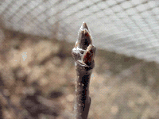 |
| Dormant bud stage |
| Photo by Robert Spencer |
Pests that may be controlled at this stage | Chemicals registered for use at this stage | Other comments |
Saskatoon Bud Moth (egg stage), leaf rollers | Bartlett Superior 70 Oil (Dormant Oil)
| Apply before or after bud break (this stage or silver tip stage)
|
Entomosporium Leaf & Berry Spot | Kumulus DF (80% sulphur)
Microthiol Disperss (80% sulphur) | Apply at bud break & at 10-14 day intervals
- May be applied at bud break and at 10-14 day intervals (1 day PHI)
- Do not apply within 30 days of mineral oil application
- Max 8x applications/season
|
Bacterial Blight (Pseudomonas syringae) - suppression | Serenade MAX / ASO / OPTI (Biofungicide - Bacillus subtilis)
| Apply before fall rains & again during dormancy |
.NOTE – Listed pesticides are registered for application at the various times indicated, however, producers should consider all relevant factors when making application decisions. Not all applications will be required each season.
Silver Tip Bud Stage
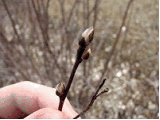 |
| Silver tip bud stage |
| Photo by Robert Spencer |
Pests that may be controlled at this stage | Chemicals registered for use at this stage | Other comments |
Saskatoon Bud Moth (egg stage), leaf rollers | Bartlett Superior 70 Oil (Dormant Oil) | Spray before bud break (apply at dormant or silver tip stage)
- Check bud axils for eggs
- Max 1x application/year
|
Entomosporium Leaf & Berry Spot | Kumulus DF (80% sulphur)
Microthiol Disperss (80% sulphur) | May be necessary if moderate to severe infection in previous year
- May be applied at bud break and at 10-14 day intervals (1 day PHI)
- Do not apply within 30 days of mineral oil application
- Max 8x applications/year
|
.
NOTE – Listed pesticides are registered for application at the various times indicated, however, producers should consider all relevant factors when making application decisions. Not all applications will be required each season.
Green Tip Bud Stage
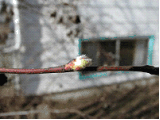 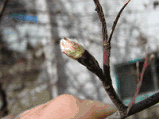 |
| Green tip bud stage |
| Photos by Robert Spencer |
Pests that may be controlled at this stage | Chemicals registered for use at this stage | Other comments |
Saskatoon Bud Moth (SBM laying eggs; hatching larvae) | Decis 5.0EC (deltamethrin 50g/L); Poleci 2.5EC (deltamethrin 25g/L) | 1st Decis application
- May be effective as late as tight cluster stage
- 21 day PHI
|
Tarnished Plant Bug (wintering TPB adults feeding on fruit buds) |
Other Plant Bugs |
Saskatoon Bud Moth | Matador 120EC / Warrior (lambda-cyhalothrin 120g/L / 122g/L) | 1st of 2 possible applications
- Max 2 applications
- 21 day PHI
- 10-15 days between applications
|
Entomosporium Leaf & Berry Spot | Kumulus DF (80% sulphur)
Microthiol Disperss (80% sulphur) | Apply at bud break & at 10-14 day intervals
- May be applied at bud break and at 10-14 day intervals (1 day PHI)
- Do not apply within 30 days of mineral oil application
- Max 8x applications/season
|
.NOTE – Listed pesticides are registered for application at the various times indicated, however, producers should consider all relevant factors when making application decisions. Not all applications will be required each season.
Full Green Stage
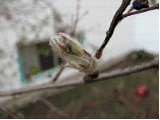 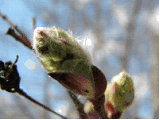 |
| Full green bud stage |
| Photos by Robert Spencer |
Pests that may be controlled at this stage | Chemicals registered for use at this stage | Other comments |
Saskatoon Bud Moth | Decis 5.0EC (deltamethrin 50g/L); Poleci 2.5EC (deltamethrin 25g/L)
- Delayed timing for SBM control (see Green Tip Stage)
| Green tip stage is the preferred stage for application
|
Entomosporium Leaf & Berry Spot | Kumulus DF (80% sulphur)
Microthiol Disperss (80% sulphur) | May be necessary if moderate to severe infection in previous year
- May be applied at bud break and at 10-14 day intervals (1 day PHI)
- Do not apply within 30 days of mineral oil application
- Max 8x applications/year
|
.
NOTE – Listed pesticides are registered for application at the various times indicated, however, producers should consider all relevant factors when making application decisions. Not all applications will be required each season.
Tight Cluster Stage
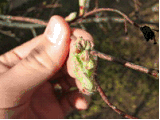 |
| Tight cluster stage |
| Photo by Robert Spencer |
Pests that may be controlled at this stage | Chemicals registered for use at this stage | Other comments |
Saskatoon Bud Moth | Decis 5.0EC (deltamethrin 50g/L); Poleci 2.5EC (deltamethrin 25g/L)
- Delayed timing for SBM control (see Green Tip Stage)
| Green tip stage is the preferred stage for application
|
Entomosporium Leaf & Berry Spot | Kumulus DF (80% sulphur)
Microthiol Disperss (80% sulphur) | May be necessary if moderate to severe infection in previous year
- May be applied at bud break and at 10-14 day intervals (1 day PHI)
- Do not apply within 30 days of mineral oil application
- Max 8x applications/year
|
..NOTE – Listed pesticides are registered for application at the various times indicated, however, producers should consider all relevant factors when making application decisions. Not all applications will be required each season.
White Tip Stage
| | | |
Early white tip stage | White tip stage | White tip stage | Late white tip stage |
Photos by Robert Spencer |
.
Pests that may be controlled at this stage | Chemicals registered for use at this stage | Other comments |
Entomosporium Leaf & Berry Spot | Kumulus DF (80% sulphur)
Microthiol Disperss (80% sulphur) | May be necessary if moderate to severe infection in previous year
- May be applied at bud break and at 10-14 day intervals (1 day PHI)
- Do not apply within 30 days of mineral oil application
- Max 8x applications/year
|
Entomosporium Leaf & Berry Spot – suppression | Switch 62.5WG (cyprodinil 37.5% / fludioxinil 25.0%)
Cyproflu (cyprodinil 37.5% / fludioxinil 25.0%) | Apply during early bloom – can be applied when petals start to show or earlier (if disease is present)
|
Entomosporium Leaf & Berry Spot
Saskatoon Berry / Juniper Rust
Coincidental control of Brown rot | Fitness / Jade / Prozol / Topas / Propi Speed / Propi Express / Propi Super / Tilt 250E / Mission 418 EC / Bumper 432EC (propiconizole 250, 418 or 432g/L) | Persistent cool, wet weather
- 1st of max 3 applications
- Apply to point of runoff
- 38 day PHI
|
Funginex DC (triforine 190g/L) | Spray to point of drip
|
Pristine WG (boscalid 25.2% / pyraclostrobin 12.8%) | Apply prior to disease development
- 7-14 day interval
- Max 4x applications/year (2 recommended)
- 29 day REI / 0 day PHI
|
Oblique-banded leafroller; spanworm; winter moth
Other leafrollers | Success / Success 480SC / Entrust 80W Naturalyte (spinosad 480g/L / 80%); Entrust Insecticide (spinosad 240g/L)
Confirm (tebufenozide 240 g/L)
Intrepid Insecticide (methoxyfenozide 240 g/L)
Exirel (cyantraniliprole 100 g/L) | Apply at time of egg hatch or to small larvae
- 7-10 day intervals
- Max 3x applications/year
- 3 day PHI
- Apply higher rate for larger larvae
- Larvae may become more exposed as buds flush
|
..NOTE – Listed pesticides are registered for application at the various times indicated, however, producers should consider all relevant factors when making application decisions. Not all applications will be required each season.
Balloon or Tube Stage
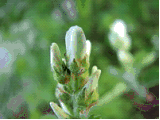 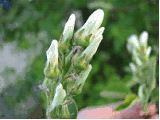 |
| Balloon or Tube stage |
| Photos by Robert Spencer |
Pests that may be controlled at this stage | Chemicals registered for use at this stage | Other comments |
Saskatoon Bud Moth
Tarnished Plant Bug
Other Plant Bugs
Saskatoon Sawfly
Hawthorn Weevil
Apple Curculio | Decis 5.0EC (deltamethrin 50g/L); Poleci 2.5EC (deltamethrin 25g/L)
- Toxic to most pollinators
| 2nd of 3 allowed applications
- Apply to both sides of orchard rows
- Apply prior to 25% bloom
- 21 day PHI
|
Fireblight – suppression | Bloomtime Biological FD Biopesticide (Pantoea agglomerans)
Kasumin 2L (Kasugamycin 2.00%) | Make 1st of maximum 2 applications at 15-20% bloom
Begin applications at bloom and continue every 3-7 days |
Entomosporium Leaf & Berry Spot | Kumulus DF (80% sulphur)
Microthiol Disperss (80% sulphur) | May be necessary if moderate to severe infection in previous year
- May be applied at bud break and at 10-14 day intervals (1 day PHI)
- Do not apply within 30 days of mineral oil application
- Max 8x applications/year
|
Entomosporium Leaf & Berry Spot – suppression | Switch 62.5WG (cyprodinil 37.5% / fludioxinil 25.0%)
Cyproflu (cyprodinil 37.5% / fludioxinil 25.0%) | Apply during early bloom – repeat after 7-10 days
- Max 3x applications
- 10 day REI
|
Entomosporium Leaf & Berry Spot
Saskatoon Berry / Juniper Rust | Fitness / Jade / Prozol / Topas / Propi Speed / Propi Express / Propi Super / Tilt 250E / Mission 418 EC / Bumper 432EC (propiconizole 250, 418 or 432g/L) | May be applied as a late 1st application if weather conditions are favourable for disease development |
Pristine WG (boscalid 25.2% / pyraclostrobin 12.8%) | Apply prior to disease development
- 7-14 day intervals
- Max 4x applications/year (2 recommended)
- 29 day REI / 0 day PHI
|
Powdery Mildew | Nova 40W (myclobutanil 40%) | Spray until drip
- 1st of max 3 applications/year
- 14 day PHI
|
Powdery Mildew | Luna Privilege (fluopyram 500g/L) / Luna Tranquility (fluopyram 125g/L / pyrimethanil 375g/L) | Begin applications preventatively
- 7-14d intervals
- 1 day PHI
|
Botrytis Gray Mold (Botrytis cinerea) | Luna Privilege (fluopyram 500g/L) / Luna Tranquility (fluopyram 125g/L / pyrimethanil 375g/L) | Begin applications preventatively
- 7-10d intervals
- 1 day PHI
|
Phytopthora Root Rot (suppression) | Phostrol (mono & dibasic sodium, potassium & ammonium phosphites 53.6%) | Begin applications as flower petals begin to emerge
|
.NOTE – Listed pesticides are registered for application at the various times indicated, however, producers should consider all relevant factors when making application decisions. Not all applications will be required each season.
Early Flowering Stage
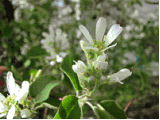 |
| Early flowering stage |
| Photo by Robert Spencer |
Pests that may be controlled at this stage | Chemicals registered for use at this stage | Other comments |
Saskatoon Bud Moth
Tarnished Plant Bug
Other Plant Bugs
Saskatoon Sawfly
Hawthorn Weevil
Apple Curculio | Decis 5.0EC (deltamethrin 50g/L); Poleci 2.5EC (deltamethrin 25g/L)
Toxic to most pollinators | 2nd of max 3 allowed applications
- Apply prior to 25% bloom
- Apply to both sides of orchard rows
- 21 day PHI
|
Fireblight – suppression | Bloomtime Biological FD Biopesticide (Pantoea agglomerans)
Kasumin 2L (Kasugamycin 2.00%) | Make 1st of maximum 2 applications at 15-20% bloom
- Begin applications at bloom and continue every 3-7 days
|
.NOTE – Listed pesticides are registered for application at the various times indicated, however, producers should consider all relevant factors when making application decisions. Not all applications will be required each season.
Full Flower Stage
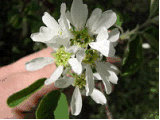 |
| Full flower stage |
| Photo by Robert Spencer |
Pests that may be controlled at this stage | Chemicals registered for use at this stage | Other comments |
Insect pollination is considered beneficial for fruit set – pesticide application during flowering can significantly injure pollinators | No pesticides or fungicides should be applied during full bloom |
- Insecticides are toxic to pollinators
- Some fungicides (e.g. sulphur) can have a repellent effect
|
Petal Fall Stage
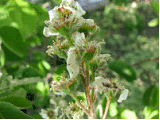 |
| Petal fall stage |
| Photo by Robert Spencer |
Pests that may be controlled at this stage | Chemicals registered for use at this stage | Other comments |
Fireblight (suppression) | Bloomtime Biological FD Biopesticide (Pantoea agglomerans)
Kasumin 2L (Kasugamycin 2.00%) | Make 2nd of max 2 applications at full bloom to petal fall
Begin applications at bloom and continue every 3-7 days |
Entomosporium Leaf & Berry Spot – suppression | Switch 62.5WG (cyprodinil 37.5% / fludioxinil 25.0%)
Cyproflu (cyprodinil 37.5% / fludioxinil 25.0%) |
- Apply 7-10 day intervals
- Max 3x applications
- 10 day REI
|
Entomosporium Leaf & Berry Spot | Kumulus DF (80% sulphur)
Microthiol Disperss (80% sulphur) | May be necessary if moderate to severe infection in previous year
- May be applied at bud break and at 10-14 day intervals (1 day PHI)
- Do not apply within 30 days of mineral oil application
- Max 8x applications/year
|
Entomosporium Leaf & Berry Spot
Saskatoon Berry / Juniper Rust
Some coincidental control of Brown rot may be expected | Fitness / Jade / Prozol / Topas / Propi Speed / Propi Express / Propi Super / Tilt 250E / Mission 418 EC / Bumper 432EC (propiconizole 250, 418 or 432g/L) | Persistent cool, wet weather
- 2nd of max 3 applications
- Apply to point of runoff
- 38 day PHI
|
Pristine WG (boscalid 25.2% / pyraclostrobin 12.8%) | Apply prior to disease development
- 7-14 day intervals
- Max 4x applications/year (2 recommended)
- 29 day REI / 0 day PHI
|
Botrytis grey mould (Botrytis cinerea) | Serenade MAX / ASO / OPTI
(Biofungicide - Bacillus subtilis)
Luna Privilege (fluopyram 500g/L) / Luna Tranquility
(fluopyram 125g/L / pyrimethanil 375g/L) | Begin applications prior to first sign of disease
|
.NOTE – Listed pesticides are registered for application at the various times indicated, however, producers should consider all relevant factors when making application decisions. Not all applications will be required each season.
Early Green Fruit Stage
| | |
Early green fruit stage |
Photos by Robert Spencer |
Pests that may be controlled at this stage | Chemicals registered for use at this stage | Other comments |
Hawthorn Weevil
Apple Curculio
adult weevils and ovipositing curculio | Decis 5.0EC (deltamethrin 50g/L); Poleci 2.5EC (deltamethrin 25g/L) | 3rd of max 3 allowed applications
- Apply 5-10 days after petal fall
- Apply to both sides of orchard rows
- 21 day PHI
|
Saskatoon Bud Moth | Matador 120EC / Warrior (lambda-cyhalothrin 120g/l / 122g/L) | 2nd possible application (after petal fall)
- Max 2 applications
- 21 day PHI
- 10-15 days between applications
|
Powdery Mildew | Nova 40W (myclobutanil 40%) | Spray until drip
- 2nd of max 3 applications/year
- 14 day PHI
|
Powdery Mildew | Luna Privilege (fluopyram 500g/L) / Luna Tranquility
(fluopyram 125g/L / pyrimethanil 375g/L) | Begin applications preventatively
- 7-14d intervals
- 1 day PHI
|
Entomosporium Leaf & Berry Spot | Kumulus DF (80% sulphur)
Microthiol Disperss (80% sulphur) | May be necessary if moderate to severe infection in previous year
- May be applied at bud break and at 10-14 day intervals (1 day PHI)
- Do not apply within 30 days of mineral oil application
- Max 8x applications/year
|
Entomosporium Leaf & Berry Spot
Saskatoon Berry / Juniper Rust
Some coincidental control of Brown rot may be expected | Fitness / Jade / Prozol / Topas / Propi Speed / Propi Express / Propi Super / Tilt 250E / Mission 418 EC / Bumper 432EC (propiconizole 250, 418 or 432g/L) | Persistent cool, wet weather
- 3rd of max 3 applications
- Apply to point of runoff
- 38 day PHI
|
Pristine WG (boscalid 25.2% / pyraclostrobin 12.8%) | Apply prior to disease development
- 7-14 day intervals
- Max 4x applications/year (2 recommended)
- 29 day REI / 0 day PHI
|
Botrytis grey mould (Botrytis cinerea) | Serenade MAX / ASO / OPTI
(Biofungicide - Bacillus subtilis)
Luna Privilege (fluopyram 500g/L) / Luna Tranquility
(fluopyram 125g/L / pyrimethanil 375g/L) | Begin applications prior to first sign of disease
|
.NOTE – Listed pesticides are registered for application at the various times indicated, however, producers should consider all relevant factors when making application decisions. Not all applications will be required each season.
Late Green Fruit Stage
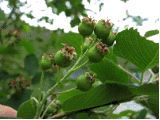 |
| Late green fruit stage |
| Photo by Robert Spencer |
Pests that may be controlled at this stage | Chemicals registered for use at this stage | Other comments |
Powdery Mildew | Nova 40W (myclobutanil 40%) | Spray until drip
- 3rd of max 3 applications/year
- 14 day PHI
|
Entomosporium Leaf & Berry Spot | Kumulus DF (80% sulphur)
Microthiol Disperss (80% sulphur) | May be necessary if moderate to severe infection in previous year
- May be applied at bud break and at 10-14 day intervals (1 day PHI)
- Do not apply within 30 days of mineral oil application
- Max 8x applications/year
|
Entomosporium Leaf & Berry Spot
Saskatoon Berry/Juniper Rust
Coincidental control of Brown rot may be expected | Pristine WG (boscalid 25.2% / pyraclostrobin 12.8%) |
- May be applied at this stage rather than early green fruit stage – disease pressure related
- 29 day REI / 0 day PHI
|
Botrytis grey mould (Botrytis cinerea) | Serenade MAX / ASO / OPTI
(Biofungicide - Bacillus subtilis)
Luna Privilege (fluopyram 500g/L) / Luna Tranquility
(fluopyram 125g/L / pyrimethanil 375g/L) | Begin applications prior to first sign of disease
|
.NOTE – Listed pesticides are registered for application at the various times indicated, however, producers should consider all relevant factors when making application decisions. Not all applications will be required each season.
Red Fruit Stage
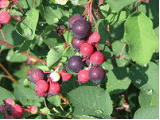 |
| Red fruit stage |
| Photo by Robert Spencer |
Pests that may be controlled at this stage | Chemicals registered for use at this stage | Other comments |
Entomosporium Leaf & Berry Spot | Kumulus DF (80% sulphur)
Microthiol Disperss (80% sulphur) | May be necessary if moderate to severe infection in previous year
- May be applied at bud break and at 10-14 day intervals (1 day PHI)
- Not recommended at late stages due to strong sulphur odours
- Do not apply within 30 days of mineral oil application
- Max 8x applications/year
|
Botrytis grey mould (Botrytis cinerea) | Serenade MAX / ASO / OPTI
(Biofungicide - Bacillus subtilis)
Luna Privilege (fluopyram 500g/L) / Luna Tranquility
(fluopyram 125g/L / pyrimethanil 375g/L) | Begin applications prior to first sign of disease
|
.NOTE – Listed pesticides are registered for application at the various times indicated, however, producers should consider all relevant factors when making application decisions. Not all applications will be required each season.
Mature Fruit Stage
Occurs in approximately mid-July, depending on season and location.
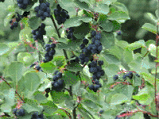 |
| Mature fruit stage |
| Photo by Robert Spencer |
Pests that may be controlled at this stage | Chemicals registered for use at this stage | Other comments |
Entomosporium Leaf & Berry Spot | Kumulus DF (80% sulphur)
Microthiol Disperss (80% sulphur) | May be necessary if moderate to severe infection in previous year
- May be applied at bud break and at 10-14 day intervals (1 day PHI)
- Not recommended at late stages due to strong sulphur odours
- Do not apply within 30 days of mineral oil application
- Max 8x applications/year
|
Woolly Elm Aphid – suppression
Woolly Apple Aphid - suppression | Admire 240F (imidacloprid 240g/L) (systemic insecticide)
Alias 240SC (imidacloprid 240g/L)
(systemic insecticide) | Apply as a soil drench when 75-100% of aphid migration is completed (typically early to mid-July)
|
Botrytis grey mould (Botrytis cinerea) | Serenade MAX / ASO/ OPTI (Biofungicide - Bacillus subtilis)
Luna Privilege (fluopyram 500g/L) / Luna Tranquility
(fluopyram 125g/L / pyrimethanil 375g/L) | Inject with a probe 15cm (6 inch) from plant at 4 locations around each plant
- Apply 1 x per season (mid-July to early August)
- 11 month PHI
|
Spotted Wing Drosophila | Delegate Insecticide (spinetoram 25%) | Ensure thorough coverage
- 1 day PHI
- Min 7 day intervals
- Max 3 apps
|
Post-Harvest Stage
Occurs in late-July to mid-August, depending on season and location
Pests that may be controlled at this stage | Chemicals registered for use at this stage | Other comments |
Woolly Elm Aphid
Woolly Apple Aphid | Orthene 75% SP (acephate)
(systemic insecticide) | Inject with a probe 15cm (6 inch) from plant at 4 locations around each plant
- Apply 1x per season (mid-July to early August)
- 11 month PHI
|
.
Dormant &/or Summer Applications - non-specific or variable stage
Pests that may be controlled | Chemicals registered | Other comments |
Aphids, mites, mealybugs, scales | Vegol Crop Oil (canola oil 96%)
Purespray Green Spray Oil 13E (mineral oil 99%) | Dormant and growing season spray
- Begin applications when pests appear – repeat at 7-14 day intervals as needed
|
Aphids | Sivanto Prime (flupyradifurone 200g/L) | Apply as directed foliar spray ensuring thorough coverage
- 3 day PHI
- Min 7 day intervals
- Max 3-4 apps
|
Septoria leaf spot (suppression) | Proline 480SC (prothioconazole 480 g/L) | Apply when first observed; repeat at 10-14 day intervals; 7 day PHI |
NOTE – Listed pesticides are registered for application at the various times indicated, however, producers should consider all relevant factors when making application decisions. Not all applications will be required each season. |
|